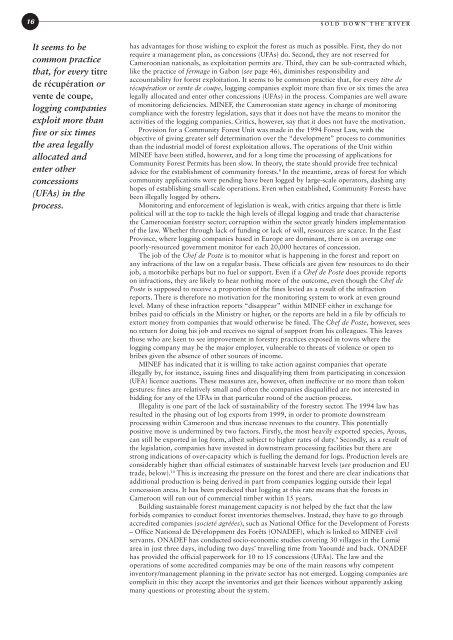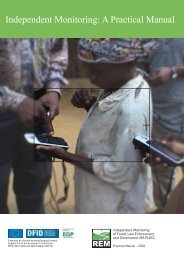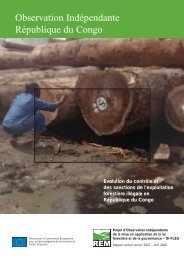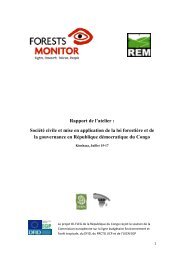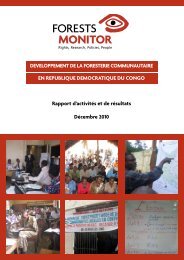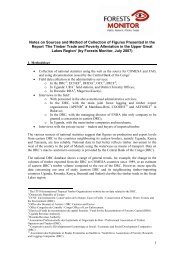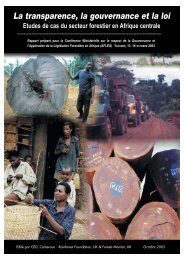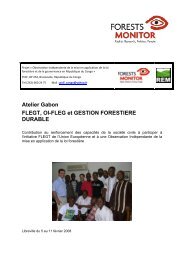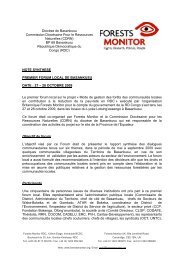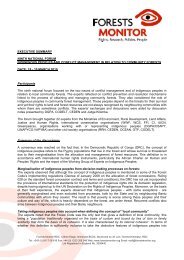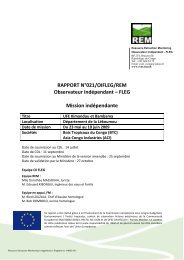Sold down the river - Salva le Foreste
Sold down the river - Salva le Foreste
Sold down the river - Salva le Foreste
You also want an ePaper? Increase the reach of your titles
YUMPU automatically turns print PDFs into web optimized ePapers that Google loves.
16SOLD DOWN THE RIVERIt seems to becommon practicethat, for every titrede récupération orvente de coupe,logging companiesexploit more thanfive or six times<strong>the</strong> area <strong>le</strong>gallyallocated andenter o<strong>the</strong>rconcessions(UFAs) in <strong>the</strong>process.has advantages for those wishing to exploit <strong>the</strong> forest as much as possib<strong>le</strong>. First, <strong>the</strong>y do notrequire a management plan, as concessions (UFAs) do. Second, <strong>the</strong>y are not reserved forCameroonian nationals, as exploitation permits are. Third, <strong>the</strong>y can be sub-contracted which,like <strong>the</strong> practice of fermage in Gabon (see page 46), diminishes responsibility andaccountability for forest exploitation. It seems to be common practice that, for every titre derécupération or vente de coupe, logging companies exploit more than five or six times <strong>the</strong> area<strong>le</strong>gally allocated and enter o<strong>the</strong>r concessions (UFAs) in <strong>the</strong> process. Companies are well awareof monitoring deficiencies. MINEF, <strong>the</strong> Cameroonian state agency in charge of monitoringcompliance with <strong>the</strong> forestry <strong>le</strong>gislation, says that it does not have <strong>the</strong> means to monitor <strong>the</strong>activities of <strong>the</strong> logging companies. Critics, however, say that it does not have <strong>the</strong> motivation.Provision for a Community Forest Unit was made in <strong>the</strong> 1994 Forest Law, with <strong>the</strong>objective of giving greater self determination over <strong>the</strong> “development” process to communitiesthan <strong>the</strong> industrial model of forest exploitation allows. The operations of <strong>the</strong> Unit withinMINEF have been stif<strong>le</strong>d, however, and for a long time <strong>the</strong> processing of applications forCommunity Forest Permits has been slow. In <strong>the</strong>ory, <strong>the</strong> state should provide free technicaladvice for <strong>the</strong> establishment of community forests. 8 In <strong>the</strong> meantime, areas of forest for whichcommunity applications were pending have been logged by large-sca<strong>le</strong> operators, dashing anyhopes of establishing small-sca<strong>le</strong> operations. Even when established, Community Forests havebeen il<strong>le</strong>gally logged by o<strong>the</strong>rs.Monitoring and enforcement of <strong>le</strong>gislation is weak, with critics arguing that <strong>the</strong>re is litt<strong>le</strong>political will at <strong>the</strong> top to tack<strong>le</strong> <strong>the</strong> high <strong>le</strong>vels of il<strong>le</strong>gal logging and trade that characterise<strong>the</strong> Cameroonian forestry sector; corruption within <strong>the</strong> sector greatly hinders imp<strong>le</strong>mentationof <strong>the</strong> law. Whe<strong>the</strong>r through lack of funding or lack of will, resources are scarce. In <strong>the</strong> EastProvince, where logging companies based in Europe are dominant, <strong>the</strong>re is on average onepoorly-resourced government monitor for each 20,000 hectares of concession.The job of <strong>the</strong> Chef de Poste is to monitor what is happening in <strong>the</strong> forest and report onany infractions of <strong>the</strong> law on a regular basis. These officials are given few resources to do <strong>the</strong>irjob, a motorbike perhaps but no fuel or support. Even if a Chef de Poste does provide reportson infractions, <strong>the</strong>y are likely to hear nothing more of <strong>the</strong> outcome, even though <strong>the</strong> Chef dePoste is supposed to receive a proportion of <strong>the</strong> fines <strong>le</strong>vied as a result of <strong>the</strong> infractionreports. There is <strong>the</strong>refore no motivation for <strong>the</strong> monitoring system to work at even ground<strong>le</strong>vel. Many of <strong>the</strong>se infraction reports “disappear” within MINEF ei<strong>the</strong>r in exchange forbribes paid to officials in <strong>the</strong> Ministry or higher, or <strong>the</strong> reports are held in a fi<strong>le</strong> by officials toextort money from companies that would o<strong>the</strong>rwise be fined. The Chef de Poste, however, seesno return for doing his job and receives no signal of support from his col<strong>le</strong>agues. This <strong>le</strong>avesthose who are keen to see improvement in forestry practices exposed in towns where <strong>the</strong>logging company may be <strong>the</strong> major employer, vulnerab<strong>le</strong> to threats of vio<strong>le</strong>nce or open tobribes given <strong>the</strong> absence of o<strong>the</strong>r sources of income.MINEF has indicated that it is willing to take action against companies that operateil<strong>le</strong>gally by, for instance, issuing fines and disqualifying <strong>the</strong>m from participating in concession(UFA) licence auctions. These measures are, however, often ineffective or no more than tokengestures: fines are relatively small and often <strong>the</strong> companies disqualified are not interested inbidding for any of <strong>the</strong> UFAs in that particular round of <strong>the</strong> auction process.Il<strong>le</strong>gality is one part of <strong>the</strong> lack of sustainability of <strong>the</strong> forestry sector. The 1994 law hasresulted in <strong>the</strong> phasing out of log exports from 1999, in order to promote <strong>down</strong>streamprocessing within Cameroon and thus increase revenues to <strong>the</strong> country. This potentiallypositive move is undermined by two factors. Firstly, <strong>the</strong> most heavily exported species, Ayous,can still be exported in log form, albeit subject to higher rates of duty. 9 Secondly, as a result of<strong>the</strong> <strong>le</strong>gislation, companies have invested in <strong>down</strong>stream processing facilities but <strong>the</strong>re arestrong indications of over-capacity which is fuelling <strong>the</strong> demand for logs. Production <strong>le</strong>vels areconsiderably higher than official estimates of sustainab<strong>le</strong> harvest <strong>le</strong>vels (see production and EUtrade, below). 10 This is increasing <strong>the</strong> pressure on <strong>the</strong> forest and <strong>the</strong>re are c<strong>le</strong>ar indications thatadditional production is being derived in part from companies logging outside <strong>the</strong>ir <strong>le</strong>galconcession areas. It has been predicted that logging at this rate means that <strong>the</strong> forests inCameroon will run out of commercial timber within 15 years.Building sustainab<strong>le</strong> forest management capacity is not helped by <strong>the</strong> fact that <strong>the</strong> lawforbids companies to conduct forest inventories <strong>the</strong>mselves. Instead, <strong>the</strong>y have to go throughaccredited companies (societé agréées), such as National Office for <strong>the</strong> Development of Forests– Office National de Développment des Forêts (ONADEF), which is linked to MINEF civilservants. ONADEF has conducted socio-economic studies covering 30 villages in <strong>the</strong> Lomiéarea in just three days, including two days’ travelling time from Yaoundé and back. ONADEFhas provided <strong>the</strong> official paperwork for 10 to 15 concessions (UFAs). The law and <strong>the</strong>operations of some accredited companies may be one of <strong>the</strong> main reasons why competentinventory/management planning in <strong>the</strong> private sector has not emerged. Logging companies arecomplicit in this: <strong>the</strong>y accept <strong>the</strong> inventories and get <strong>the</strong>ir licences without apparently askingmany questions or protesting about <strong>the</strong> system.


